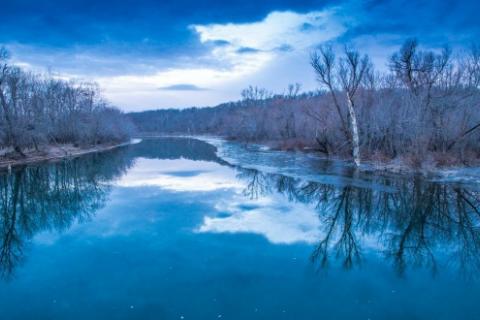
It happened so quickly. The sudden plunge took your breath away. You lost your footing in the trout stream, ventured over a section of thin ice, or leaned out a little too far to snag the last duck decoy. You managed to pull yourself from the freezing water, but now you’re shocked, soaked, and in serious trouble.
Sadly, scores of hunters and anglers lose their lives to hypothermia every year. Understanding the danger and taking a few simple steps can boost your odds for survival.
1. Remain Calm
While it varies with water temperature and body mass, the onset of hypothermia can 30 minutes or more. That is much longer than most people think. Knowing this fact can help you remain calm and think rationally to carry out the next steps. Panicking will only use precious time and energy.
2. Find Shelter from the Wind
Wind saps heat rapidly when it hits wet clothing. Seek protection from gusts immediately.
Find the nearest source of shelter and take refuge while planning your next step. If you are on a boat get behind a windshield or below the deck line. If you’re on land, retreat behind trees, rocks, or a steep bank.
3. Get Dry
Change into dry clothes as soon as possible. If you have friends with you, use dry clothing items from each of them. If you are by yourself, take wet clothing off and wring it out before putting it back on. Every drop of water you can remove increases your chances of survival.
4. Keep Moving
How quickly can you make it back to camp or your vehicle? You must now make a decision and stick with it.
If you’re on shore, walking to the truck can help you generate warmth, but a long trek in the wind could be fatal. If you are in a boat, firing up the engine could be the fastest way to a warm vehicle, but solo operation could quickly become dangerous.
Find shelter on land and start gathering firewood if you find yourself too far from the boat ramp or a building. The movement will generate body heat until you are able to spark a fire.
If you must ride a boat, flex your muscles and rub your arms and legs to keeps the blood flowing.
5. Utilize a Heat Source
Slowly introduce a heat source such as fire, hand warmers, or the heater in your vehicle. Once you are able, move indoors and get completely dry. Be sure to stay adequately hydrated and do not hesitate to visit a medical facility if needed.
Prevent & Prepare:
Wade fishing in cold weather and cold water offers special challenges. Wearing a PFD, waders with a waist belt, and high quality layered clothing are precautions against cold water accidents.
A simple emergency kit can go a long way towards insuring your survival after a fall in cold water. A lighter, fire starter, space blanket and hand warmers can easily be placed in a small, sealable plastic bag. Also be sure to include a small heater or backpacking stove and extra clothing in your boat or vehicle.
- 8728 views

